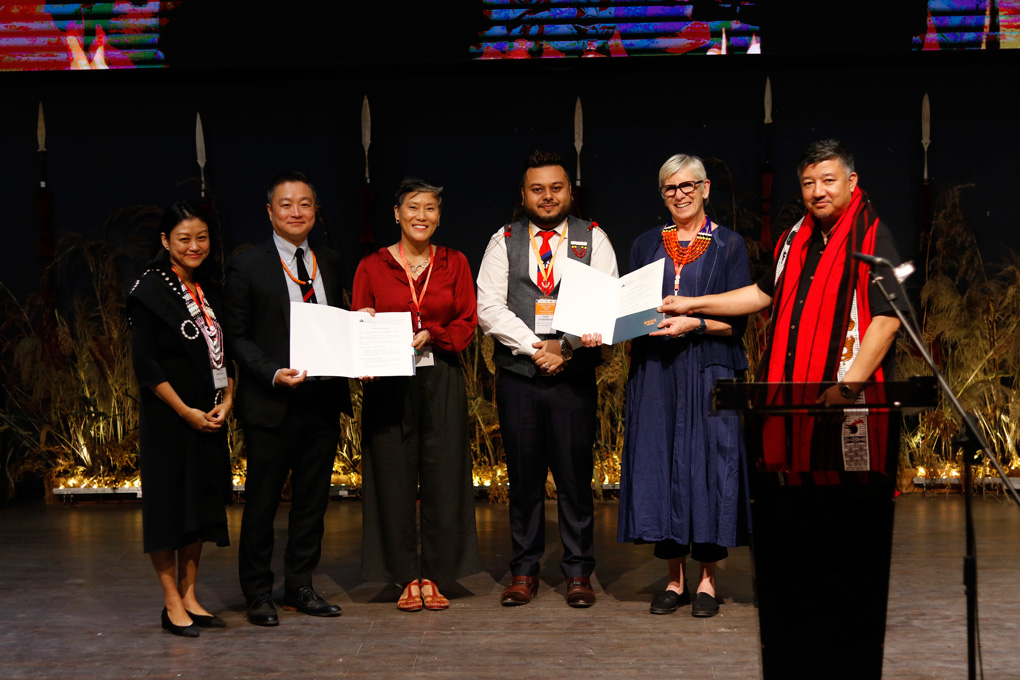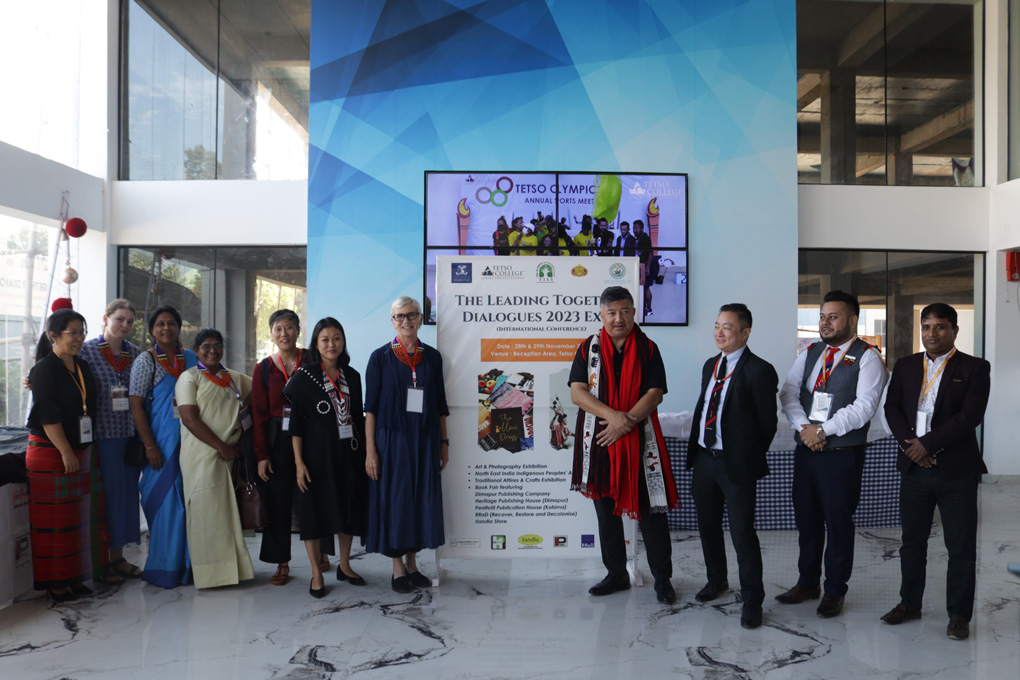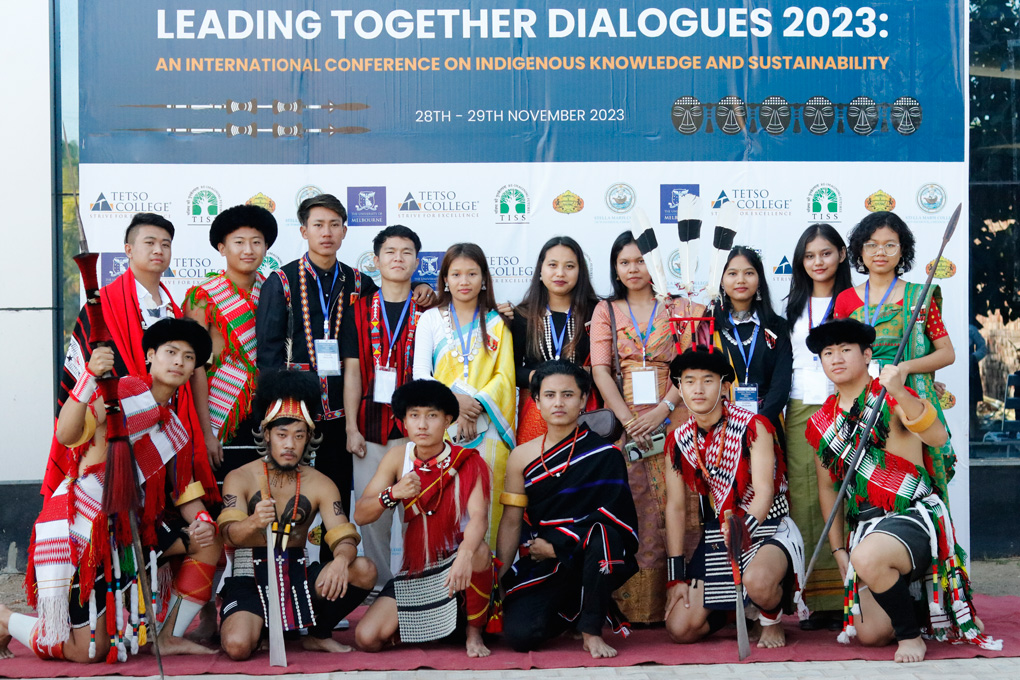A two-day international conference ‘Leading Together Dialogues 2023’ on the theme ‘Indigenous Knowledge & Sustainability’ hosted by Tetso College commenced on November 28 with Shri Abu Metha, Advisor to the Chief Minister, Government of Nagaland as the Special Guest.
The Leading Together Dialogues was initiated in 2021 and is a collaboration between undergraduate students led by the University of Melbourne and undergraduate students at four leading institutions across India – Tetso College in Nagaland, Stella Maris College in Chennai, Savitribai Phule Pune University, and the Tata Institute of Social Sciences, Guwahati campus.
The inaugural session of the Leading Together Dialogues 2023 began with the grand processional entry of the special guest, delegates and invitees, which was led by the cadets of National Cadet Corps of Tetso College.
The Director of Tetso College Mr. Kvulo Lorin gave the welcome address. He felicitated the Special Guest Shri Abu Metha, the representatives and delegates from the collaborating colleges and the invitees of the conference. In his welcome speech Mr. Lorin called for action with respect to the goals of the conference leading towards effective empowerment of the indigenous communities.
Prof. Kate MacNeill, Associate Dean, Education and Students, University of Melbourne expressed her gratitude, excitement and how happy she was to be in Nagaland attending the leading together conference and also applauded the warm hospitality of the host college. The University of Melbourne also presented the students’ delegates with gift hampers acknowledging their enthusiasm. Prof. Kate Macneill gave credits to Prof. Priya Daniels for taking the initiative and taking the opportunity of a united board fellowship which gave her an opportunity to spend some time at a university in the Asia Pacific region and also she did a short course at Harvard university for four weeks in leadership. Prof. Kate Macneill also expressed how fortunate she was to be approached by the united board to host a united board fellowship with another university and with Prof. Priya Daneils, Prof. Kate knew it was a perfect match. And from then on Prof. Priya Daniel and Prof. Kate Macneill spend three months working together and Prof. Kate expressed this duration to be a truly reciprocal mentoring process. And this was what prompted the leading together initiative which has grown since time and now people can see the potential and strength of this partnership.
The first Conference was in Stella Marris college in Chennai and it was really a partnership between the two colleges who were committed towards giving back to the community and they really had faith that it will grow bigger and bigger but then pandemic happened and for a while it felt no one really was confident enough to do very much. As the pandemic went on, they realized that they couldn’t just sit in their own bubbles as they were and they needed to reach out and strengthen the partnership and also even extend this community. They decided to expand in an online environment and hosted the wonderful gathering online under “Leading Together 2021 dialogues on Women and leadership” and at the same time they introduced three other institutions in their Collaboration. Savitribai Phule University, Tetso College and Tata Institute of social sciences in Gauhati. The collaboration grew even more enthusiastic with more people and a more ambitious program and gained an enormous amount of Momentum. Prof. Kate Macneill also expressed how the leading together project opened her eyes in many ways to the potential that is in each one of us and each one of our students who were challenged to inspire,create and bring something part of their culture together and to explore ideas through creative practice. They have planted the seeds and are beginning to see the benefits of that.
The students who have experienced it have only wonderful words to say about it. They enjoyed working in teams to come to leading together, they also enjoyed exploring their own culture, preparing a presentation for leading together and they also discovered having an opportunity to meet with others that they might have never met before. When they first started they thought it was just sort of a bilateral Australian Indian partnership but it grew into an Indian Indian partnership and Australia is just carrying along with it Prof. Kate stated.
Prof. Kate also stated how this collaboration brought them to surprising places, the conference here in Nagaland which they never thought there’d come was also brought to them in a very special time for the university of Melbourne. Where they have recently adopted a strategy which focuses on their responsibility to the first people of australia. She acknowledges the
colonial history of Australia , and of coming to terms with the impact that they had on the indigenous people of australia. She lamented on how the university itself has been very much a traditional sort of western institution and colonial in some of its traditions and so they have to reflect on their practices and really embrace a transformative approach to education, research
and their curriculum. For which, some important strategies within the indigenous policies have to be implemented. One of these is to build a global indigenous knowledge centre and this is a scenario where there is a lot of potential for further collaboration not only in Australia but across the world.

A Memorandum of Understanding (MoU) was signed between the host college, Stella Maris College and University of Melbourne by their representatives Dr. Hewasa L. Khing, Prof. Kate MacNeill and Dr. Sr. Stella Mary. The MoU takes forward the collaborative approach of the participating institutions in pursuit of the shared goals of the Leading Together programme. It
shall open the road for future collaborations and partnerships in education and research.
During the special guest’s address, Shri Abu Metha, Advisor to the Chief Minister, Government of Nagaland, shared his greetings. On behalf of the Chief Minister he welcomed all the guests to Nagaland. He invited them to visit the hills, mountains, and the villages of Nagland to feel the heartbeats of the Naga people where the sounds, colors, and scents can enrich the experience and understanding of Naga society.
He expressed gratitude to God for the opportunity of fellowship offered through this programme. He shared his appreciation for the organizers of the Leading Together Dialogue 2023, for its continuity and success. He congratulated the institutions behind the programme for the signing of an MoU for collaboration. He assured cooperation and support of the Nagaland Government
towards the strategies and aspirations contained within the MoU. He also expressed interest in collaboration for the project of setting up a Centre of Indigenous Knowledge as mentioned by the representative of the University of Melbourne.
He acknowledged the role of scholars, academicians, and experts who are leading together dialogues and international conferences in the fields of indigenous knowledge and sustainability. He registered the need for more platforms and opportunities for Naga peoples to contribute in the dialogues. Towards this cause he called for more research into the Naga traditional practices passed on by the forefathers. He discussed some traditional practices as part of the Naga indigenous knowledge, including agricultural practices, foods, medicines, and disaster responses. He asserted the strength of the Naga society remains the close-knit community, social bonding and culture of sharing. He emphasized there is a need for balance between change and rootedness. He spoke of the Naga society as a tree which needs to have strong roots for its branches to grow taller and wider.
He acknowledged the challenges with respect to changes. He insisted that despite some shortfalls in cultures and traditions there is much to be learned from the Naga communities. He recalled a discussion about the fast-track courts in Indian judiciary as being inspired by customary courts of the Nagas and other tribal communities of the North-East region. He claimed that change is inevitable. There is a need for Naga society to cling on to the positives in their culture, correct the negatives, adapt to a changing world and keep moving forward. He welcomed the panel of experts present and instilled confidence in them to engage in the discussion on this subject by sharing experience and knowledge.

He applauded Tetso college as one the most progressive colleges in Nagaland and the entire Northeast region. He concluded by expressing confidence in the potential of the students and the institution to reach the heights of aspirations and ambitions underlying the vision of the Tetso College and the Leading Together Dialogues.
The Principal of Tetso College, Dr. Hewasa L. Khing shared the Tetso Vision 2030 document. It is a sign of solidarity with the theme of the Leading Together International Conference. She declared the Tetso Vision 2030 as a thought initiative, a commitment made by the Tetso Community members in the presence of all the esteemed guests. The vision is to make a
meaningful connection towards preserving heritage, towards empowering indigenous communities, and creating sustainable futures. The mission is to create an impactful educational environment that honours and integrates the indigenous knowledge systems and prepares the student community to address global challenges through sustainable best practices. She presented the five core action items the Tetso Vision 2030: (1) Integration of indigenous knowledge and education by building relationships and meaningful collaborations with local indigenous communities and international experts in their respective fields to ensure excellence and relevance, (2) community engagement and collaboration, (3) research and documentation on traditional practices and exploring their applications in modern contexts, (4) cultural competence and sensitivity through training and development of resources, (5) sustainable campus practices and global awareness and advocacy. Dr. Hewasa highlighted the role of educators, community leaders, government, and students towards the accomplishment of goals laid out in the Vision document. As outcomes of the Vision 20230 aims for (a) graduates committed towards the preservation of indigenous knowledge with a much deeper understanding and a stronger appreciation of heritage and culture, graduates who can contribute to sustainable practices in their respective fields, (b) strengthen partnerships with indigenous communities to foster mutual respect and collaboration, (c) development of a repository of information on indigenous knowledge to serve as a resource for future generations, (d) to be renowned as a leader in the integration of indigenous knowledge and sustainability in education. The signatories of the vision document are the Tetso College Executive Committee members, the Tetso college Governing Body, advisory members which include Prof. Dolly Kikon, Prof. Kate MacNeill, Shri Abu Metha, Dr. Sedevi Angami. The advisory members were invited to sign the document after the declaration.
The day’s proceedings consisted of panel discussions, workshops, and culminated with a cultural programme in the evening.

